college life 教案
大学生活英语教案模板范文
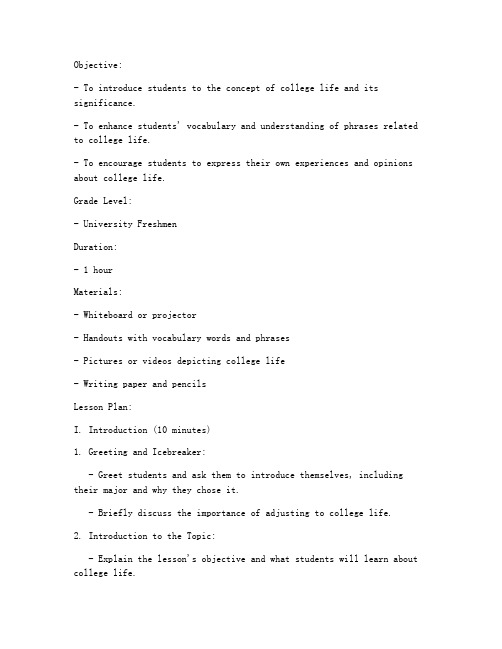
Objective:- To introduce students to the concept of college life and its significance.- To enhance students' vocabulary and understanding of phrases related to college life.- To encourage students to express their own experiences and opinions about college life.Grade Level:- University FreshmenDuration:- 1 hourMaterials:- Whiteboard or projector- Handouts with vocabulary words and phrases- Pictures or videos depicting college life- Writing paper and pencilsLesson Plan:I. Introduction (10 minutes)1. Greeting and Icebreaker:- Greet students and ask them to introduce themselves, including their major and why they chose it.- Briefly discuss the importance of adjusting to college life.2. Introduction to the Topic:- Explain the lesson's objective and what students will learn about college life.- Show a brief video or a series of pictures depicting various aspects of college life (e.g., classes, dorms, extracurricular activities).II. Vocabulary Building (15 minutes)1. Vocabulary Presentation:- Write key vocabulary words and phrases on the board or display them on the projector.- Define each word/phrase and provide a sentence for context.- Vocabulary words may include: campus, dormitory, syllabus, lecture, tutor, study group, extracurricular, academic, social, etc.2. Group Activity:- Divide the class into small groups.- Ask each group to create a list of five new vocabulary wordsrelated to college life.- Groups present their lists to the class, and the teacher confirms the correctness of the words.III. Discussion and Reflection (20 minutes)1. Discussion Questions:- Pose several open-ended questions to stimulate discussion about college life.- Questions may include:- What are the biggest challenges you face in college?- How do you manage your time between classes and extracurricular activities?- What advice would you give to a freshman starting college?- How do you balance academic and social life?2. Personal Reflection:- Instruct students to write a short paragraph reflecting on their first few weeks or months of college.- Encourage them to use the new vocabulary words in their writing.IV. Writing Activity (15 minutes)1. Writing Prompt:- Provide a writing prompt related to college life, such as:- Describe a memorable experience you've had in college so far.- Write about a time you had to overcome a challenge in your academic or social life.- Discuss your future goals and how you plan to achieve them in college.2. Guided Writing:- Give students a few minutes to brainstorm ideas and outline their writing.- Walk around the room to provide individual feedback and assistance.V. Conclusion (10 minutes)1. Summary:- Review the key points discussed during the lesson, emphasizing the importance of adjusting to college life and the new vocabulary learned.2. Homework Assignment:- Assign the following homework:- Write a 200-300-word essay on the writing prompt provided.- Review the vocabulary words and phrases, and create a sentence using each word/phrase.Assessment:- Evaluate students' participation in discussions and group activities.- Assess the quality of their written reflection and essay.Additional Resources:- Provide students with a list of useful online resources and books about college life.- Encourage students to share their own experiences and stories with the class to foster a sense of community.。
UNIT-1-College-Life-大学生活讲课讲稿

There seems to be no satisfactory explanation satisfying:令人感到满意的 satisfied:某人感到满意的 be ~ with sincerely:真诚地;真心地
➢ I sincerely hope you'll come with us.
Stereotype:
It is a form of generalization about some group of people. When people stereotyping others, they take a category of people and make assertions about the characteristics of all people who belong to that category.
Words and expressions
❖ accompany: vt.陪同,陪伴;伴随...发生; 她要求我陪她到机场去。
She asked me to accompany her to the airport. 闪电通常伴有雷声。
Lightning usually accompanies thunder. ❖ assured: 动词assure(使…确信)的过去式和过去分
Words and expressions
obtain: Further information can be obtained from head office.
pursue: Students should pursue their own interests, as well as do their schoolwork. pursue a career
新世纪大学英语book1-Unit 1 college life教案

Unit One: College LifeText A Secrets of Straight-A StudentsSection One Teaching Objectives1. Grasp the main idea and structure of the text;2. Master the key language points and grammatical structures in the test;3. Conduct a series of reading, listening, speaking and writing activities related to the theme.Section Two Key Words and Expressionsmake the most ofget the best advantage from 最大限度利用e.g. 1. Jim studied hard in the training class; he wanted to make the most of his chance to learn.2. The occasion only comes once in five years, and they naturally make the most of it.这个机会五年才有一次,他们当然会充分利用。
attain vt.fml gain or arrive at, esp. after long effort; reach〖正式〗(长期努力后)获得,达到e.g. 1. He attained fame through many years of hard work.2. We need to identify the best ways of attaining our goals.我们需要确定达到我们目标的最好方法。
[VIP专享]B1U1-College Life
![[VIP专享]B1U1-College Life](https://img.taocdn.com/s3/m/523b2970dd36a32d737581d3.png)
第 1 次课教案授课章节Unit 1 College Life授课时数2教材名称当代高职高专英语第一册主编盛跃东出版社及版本06年8月1版课型新授课+练习课主要教学方法讲授、提问、讨论授课班级授课时间月日授课班级授课时间月日授课班级授课时间月日授课班级授课时间月日教学目的1、了解大学生活并掌握获得幸福大学生活的关键2、掌握一些常用词、短语和句型的用法,如:activity, require, due, increase, energy, perform, avoid, trust, show, vacation, career, campus, recall, benefit from, put…in order, take the time to do sth., make friends, deal with, result in, hunt for等3、了解翻译的基本标准,学习基本翻译技巧重点文章阅读技巧重点表达方法翻译难点重点表达方法翻译教学过程时间分配I. Lead-in Activity: discussionUnit 1 College LifeII. New Text AnalysisStep One. introduce reading skills—skimming and scanningStep Two. ask students to go over the text and do reading comprehension exercise on page 8 and 9 by using the skills of skimming and scanning 5’40’教学过程Step Three. detailed understating1. structure2. language focusIII. do exercise from page 10-13IV. Part 3 Translation and Writing V. Part 4 grammarVI. conclusion and assignment1. review text A2. preview text B and remaining exercises 18’20’5’2’课后小结:参考文献:1.Teacher’s Book 2.Longman Dictionary教学过程I. Lead-in Activity: discussion (5’)【try to get students actively involved and demonstrate their opinions】Going to college is one of our greatest dreams. After having studied hard for many years, this dream comes true at last. You must have lots of expectations from college life. Please think over the following questions.1. what kind of college students do you expect to be?2. what do you hope to do at college?II. New Text Analysis (40’)Step One. introduce reading skills—skimming and scanning【draw students’ attention to these two skills and write them down on blackboard】1. how to skimTitleIllustrationsFirst and last paragraphBody part---topic sentence2. how to scanFind out the key words in the question and locate the information in the textStep Two. ask students to go over the text and do reading comprehension exercise on page 8 and 9 by using the skills of skimming and scanningStep Three. detailed understating1. structure: two partsPart one: para.1Part two: para.2-9 (topic sentence at the beginning)2. language focusPara.11) HopeHope to do: He hopes to become a grey-collar one day.Hope for sth.: I hope for a better job.Hope that..: We all hope that we can have a happy college life.2) Live a…life=lead a …lifeLive a miserable/terrible/interesting lifepara. 23) make a schedule of=make a plan of4) write downwrite down + nwrite+ pron.+ down5) so thatpara.36)put sth in order7)If you have an assignment that requires a lot of work8)At the top of9)Be efficient in doing效率高的;有能力的,能胜任的[(+in)]e.g.: He is an efficient manager.10)Due (adj.)应有的,正当的,合适的[B]Eg. He handled it with due care.到期的[F]Eg.The bank loan is due this month.因为,由于[(+to)]Eg. Our happy childhood is due to our father's hard work.11)Be stressed about doing 紧张的,感到有压力的para.412) doing some sort of physical activity for thirty minutes three times a week willgreatly lower your stress leveldoing…动名词短语作主语Eg. Seeing is believing.13) Taking the time to exercise will help get your mind off the stress in your life.take the time to do抽时间做锻炼Eg. He takes the time to write to his parents every week.get one’s mind off sth.使某人不想某事Eg. He cannot get his mind off the coming examination.Para.514) wishWish后可接宾语从句,连词that可省略,宾语从句中的动词常用虚拟语气。
大学生活英语教案模板范文

教学目标:1. 学生能够用英语描述大学生活的不同方面,如学习、社交、娱乐等。
2. 学生能够通过讨论和角色扮演,提高英语口语表达能力和听力理解能力。
3. 学生能够了解不同文化背景下的大学生活差异。
教学对象:高级英语学习者(大学生)教学时间: 45分钟教学材料:1. 大学生活相关图片或视频2. 小组讨论卡片3. 角色扮演剧本4. 白板或投影仪教学步骤:Step 1: 导入(5分钟)1. 使用PPT或视频展示大学生活的图片,如图书馆、教室、宿舍、食堂等。
2. 提问学生:“What do you think about college life? What are some of the things you enjoy or find challenging?”3. 学生回答后,教师总结并引出本节课的主题。
Step 2: 讲解和练习(15分钟)1. 将学生分成小组,每组发放讨论卡片,卡片上列出大学生活的各个方面,如学习、社交、娱乐、生活技能等。
2. 每组讨论并列举出这些方面的具体例子,如:- 学习:上课、做作业、参加学术讨论- 社交:结交朋友、参加社团活动、组织聚会- 娱乐:看电影、运动、参加文艺活动- 生活技能:洗衣、做饭、管理财务3. 小组代表向全班汇报讨论结果,教师引导学生用英语描述。
Step 3: 角色扮演(15分钟)1. 分配角色,如新生、学长、教授、室友等。
2. 发放角色扮演剧本,剧本中包含大学生活的各种场景,如:- 新生入学咨询- 课堂讨论- 宿舍生活- 社团活动3. 学生根据剧本进行角色扮演,教师巡回指导,纠正发音和语法错误。
Step 4: 总结和反馈(5分钟)1. 教师总结本节课的学习内容,强调大学生活的重要性和多样性。
2. 学生分享学习心得,教师给予反馈和鼓励。
3. 布置课后作业,如写一篇关于大学生活的英语短文或制作一个关于大学生活的PPT。
教学评价:1. 课堂参与度:观察学生在课堂上的发言和互动情况。
Unit 7 College Life新编大学英语第二版第四册教案
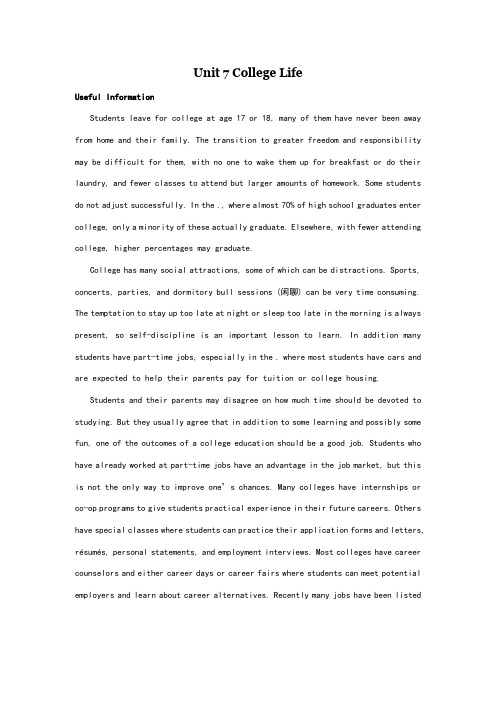
Unit 7 College LifeUseful InformationStudents leave for college at age 17 or 18, many of them have never been away from home and their family. The transition to greater freedom and responsibility may be difficult for them, with no one to wake them up for breakfast or do their laundry, and fewer classes to attend but larger amounts of homework. Some students do not adjust successfully. In the ., where almost 70% of high school graduates enter college, only a minority of these actually graduate. Elsewhere, with fewer attending college, higher percentages may graduate.College has many social attractions, some of which can be distractions. Sports, concerts, parties, and dormitory bull sessions (闲聊) can be very time consuming. The temptation to stay up too late at night or sleep too late in the morning is always present, so self-discipline is an important lesson to learn. In addition many students have part-time jobs, especially in the . where most students have cars and are expected to help their parents pay for tuition or college housing.Students and their parents may disagree on how much time should be devoted to studying. But they usually agree that in addition to some learning and possibly some fun, one of the outcomes of a college education should be a good job. Students who have already worked at part-time jobs have an advantage in the job market, but this is not the only way to improve one’s chances. Many colleges have internships or co-op programs to give students practical experience in their future careers. Others have special classes where students can practice their application forms and letters, résumés, personal statements, and employment interviews. Most colleges have career counselors and either career days or career fairs where students can meet potential employers and learn about career alternatives. Recently many jobs have been listedon the Internet, making it easier to match students with suitable opportunities and more important for students to acquire computer skills.College can be an exciting and rewarding experience, but it can also be very stressful. Making their own decisions can be very difficult for young people accustomed to parental supervision. When students make bad decisions, such as drinking too much beer or procrastinating in their studies, they are not always mature enough to admit or correct their mistakes. But having the freedom to make these mistakes, and the obligation to face their consequences, is part of the learning process. When older people look back on their student years, they usually view this as a happy period of life, even if it did not always feel that way at the time.Parents, teachers, advisors, and counselors can help students move successfully from high school to college and from college to careers. But in the last analysis students must do most of this for themselves, with more help than we may realize from their friends and classmates. College students learn as much outside as inside the classroom, and most of this is not learned from adult authority figures. The peer group and the youthful popular culture are increasingly strong influences on today’s students. So parents and other potential role models should try to be aware of this, even if they don’t always appreciate the latest trends in casual clothing or pop music. College is a time of change, and the parents can learn almost as much from this as the students can. They too were once students, just as today’s students will one day be parents.Part One PREPARATION1. Talking about Your High-School ClassmatesSample:I graduated from __________ High School, a key high school in __________ Province. Among the 50 students in my class, 48 are enrolled in universities, mostly national key universities. Three went to Peking University and two to Tsinghua University. The three who went to Peking University are majoring in Law, Philosophy and Physics respectively and the two who went to Tsinghua University are majoring in Computer Science and Information Science. In this university alone there are five of us, doing different majors; three of my former classmates are enrolled in normal universities, one in Beijing Normal University, one in South China Normal University and one in East China Normal University.2. Talking about Your College Life—Expectations vs RealitySample:1) Campus:Expectations—large and beautiful campus with green grass everywhere and a large sports ground, where you can always see students busy and full of vitality.Reality—Just as what I dreamed of – a huge campus with magnificent modern buildings, green trees, blooming flowers and a river flowing around.—Contrary to what I expected, it’s an old campus, large though, with grey buildings like huge match-boxes, little grass, and a few big trees.2) Classroom buildings:Expectations—large new classrooms with modern facilities.Reality—well equipped teaching buildings with multi-media facilities.—large old buildings, with a few classrooms well equipped with modern facilities.3) Dormitories:Expectations—crowded with little space for everyone.Reality—true, but we may choose to live in a double room if we can afford the rent.4) Students’ cafeterias:Expectations—spacious dining halls, full of hungry students.Reality—true, and there is a great variety of food that will definitely appease our appetite.5) Library:Expectations—a large collection of books, journals and periodicals; spacious and well-lit reading rooms.Reality—true except that the reading rooms are not large enough and students have to get there early in order to find a seat.6) Classmates:Expectations—friendly and speaking different dialects.Reality—true.7) Teachers:Expectations—old, gray-haired and wearing thick glasses; strict and formally dressed.Reality—not true because many teachers are very young, especially English teachers, many teachers do not wear glasses and many teachers wear casual clothes.3. Happy College DaysSample1:The most impressive experience for me is running for the chair of the Student Union. I used to be very timid. That experience, however, helped me gain much confidence. For the first time, I made a public speech and realized, all at once, that I had the potential to organize. One thing that shouldn’t be left out is thatmy friends and classmates gave me enormous support. I did appreciate what they had done for me.Sample 2:I believe that the New Year’s Eve of 2004 can never be erased from my mind. Thousands of students gathered in the auditorium waiting for the new year. We held the lighted candles in our hands, our hearts beating with the rhythm of the music. Minutes went by. When the big clock finally turned straight upward, screams and laughter resonated in the hall. We hugged and said New Year’s greetings to each other. It was such a thrilling moment.4. Ten “Cs” Essential for College Stude nts1) Creativity; 2) Commitment; 3) Connection; 4) Confidence; 5) Courage;6) Cooperation; 7) Curiosity; 8) Competence; 9) Consideration; 10) CommunicationPart Two READING-CENTERED ACTIVITIESIn-Class ReadingPre-Reading1) I 2) F 3) J 4) B 5) G 6) C 7)A 8) E 9) D 10) HPassage ReadingWords, Phrases and Grammatical Points1. You have spent four years supposing that failure leaves no record. (l.2-3, Passage I)这个句子中leave 表示to allow or cause something to stay。
新目标大学英语综合教程第一册Unit1 College life教案
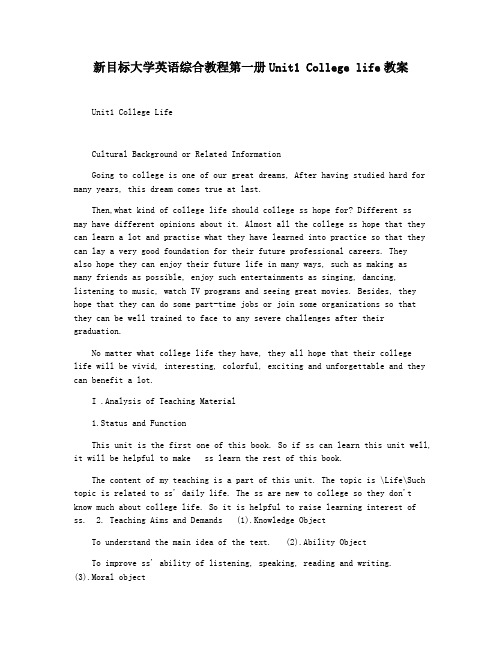
新目标大学英语综合教程第一册Unit1 College life教案Unit1 College LifeCultural Background or Related InformationGoing to college is one of our great dreams, After having studied hard for many years, this dream comes true at last.Then,what kind of college life should college ss hope for? Different ssmay have different opinions about it. Almost all the college ss hope that they can learn a lot and practise what they have learned into practice so that they can lay a very good foundation for their future professional careers. Theyalso hope they can enjoy their future life in many ways, such as making as many friends as possible, enjoy such entertainments as singing, dancing, listening to music, watch TV programs and seeing great movies. Besides, they hope that they can do some part-time jobs or join some organizations so that they can be well trained to face to any severe challenges after their graduation.No matter what college life they have, they all hope that their collegelife will be vivid, interesting, colorful, exciting and unforgettable and they can benefit a lot.I .Analysis of Teaching Material1.Status and FunctionThis unit is the first one of this book. So if ss can learn this unit well, it will be helpful to make ss learn the rest of this book.The content of my teaching is a part of this unit. The topic is \Life\Such topic is related to ss' daily life. The ss are new to college so they don't know much about college life. So it is helpful to raise learning interest of ss. 2. Teaching Aims and Demands (1).Knowledge ObjectTo understand the main idea of the text. (2).Ability ObjectTo improve ss' ability of listening, speaking, reading and writing. (3).Moral objectTo help ss to be a happy college student. 3. Teaching Key Points and DifficultyTo master some new words and Language Focus of text A. To train ss howto use them by reading and writing. 4. Teaching Time Two periodsⅡ.Teaching MethodsThe Situation Language Teaching Method Student-centered Teaching Method Task-based Language Teaching MethodActivity-based Teaching Method (individual work, pair work,group work and class work)Ⅲ.Learning MethodsBasic Learning Method Practice Learning MethodⅣ.Teaching StepsStep1.Greet the classT: Good morning ,boys and girls. Ss: Good morning.T: Welcome to our college, My name is --, I hope we'll get along very well. I'm not only your teacher ,but can be your friend. I'll give my best wishes to you. Ss: Thank you. ... ...Step2. Speaking Practice(get to know each other)Step3. Listening Practice(Three activities should be done) ?. Sound recognition.?. Listen to conversations and fill in blanks.? .Listen to a passage and choose correct answers. Step4.Reading?.Lead-in Activity:Discussion .There are two questions to discuss.Q1:What kind of college life shouldexpect to be . Q2:What do you hope todo at college? ?.Understanding the text .Choose the best answers for eight statements on page 8. ?.Language FocusA: hope to do sth. hope for sth. hope that. B: live a ...lifeThey lived a very terrible life 10 years ago. We are now living a veryinteresting life. C. put...in orderThe new teacher could not put our class in order. She always puts herbooks in order D. be efficient in doing sth.He is efficient in studying the problem so quickly Who can be efficient incarrying out the plan. E.get one's mind off sthPlease get your mind off the coming examination. He can't get his mindoff his mistakes in the test. F. at one's bestThese flowers are at their best in spring.He was never at his best early in the morning.Step5 .SummaryNo matter what college life you'll have, I hope your college life will bevivid, interesting, colorful, exciting and unforgettable and they can benefita lot. During these 3 years,you can lay a very good foundation for your futureprofessional careers . After your graduation, all of you can face to anysevere challenges .Ⅴ. Blackboard DesignUnit1 College LifeQuestion1: Question2: Teaching Focus: 1.the using of hope...... ... ...感谢您的阅读,祝您生活愉快。
《21世纪实用英语》Unit 1 College Life 教案(B层)
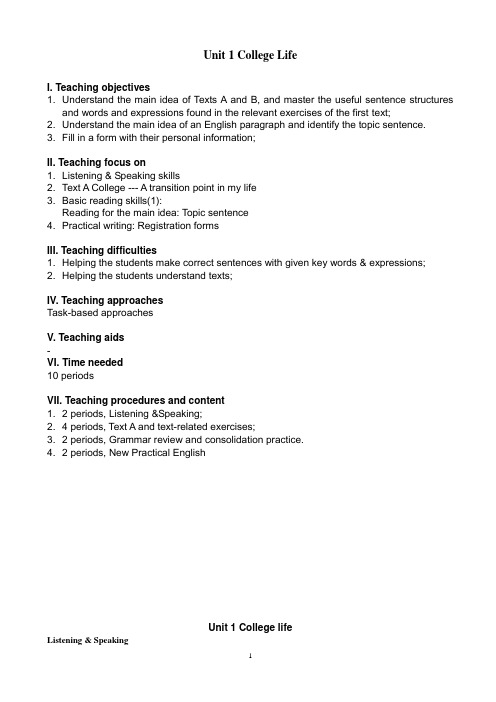
Unit 1 College LifeI. Teaching objectives1. Understand the main idea of Texts A and B, and master the useful sentence structuresand words and expressions found in the relevant exercises of the first text;2. Understand the main idea of an English paragraph and identify the topic sentence.3. Fill in a form with their personal information;II. Teaching focus on1. Listening & Speaking skills2. Text A College --- A transition point in my life3. Basic reading skills(1):Reading for the main idea: Topic sentence4. Practical writing: Registration formsIII. Teaching difficulties1. Helping the students make correct sentences with given key words & expressions;2. Helping the students understand texts;IV. Teaching approachesTask-based approachesV. Teaching aids-VI. Time needed10 periodsVII. Teaching procedures and content1. 2 periods, Listening &Speaking;2. 4 periods, Text A and text-related exercises;3. 2 periods, Grammar review and consolidation practice.4. 2 periods, New Practical EnglishUnit 1 College lifeListening & SpeakingLead inThe teacher explains the Lead-in so that the students will have some idea of what this unit is about. Then, the teacher writes the word “freshmen” on the blackboard and lets the studentsA. guess the meaning of the word;B. tell how they feel now that they are in college and what problems they have;C. have a look at the words and expressions in the box;D. watch the video and tell what is said in the video with help from the teacher;E. do the True or False exercise and watch the video again;F. exchange their views on life in college.Listening & SpeakingAfter the Lead-in, the teacher asks the students to do the following:1) Introducing YourselfA. Listen to the first half of the short talk in Ex. 1 twice and fill in the missing words;B. Listen to the second half of the short talk in Ex. 1 twice and fill in the missing words;C. Listen to the whole short talk and do Ex. 2.2) Getting to Know PeopleA. Go through the new words in Ex. 3 and listen to the conversation twice while filling in the missing words;B. Answer the questions by way of group discussion or the traditional teacher-student interaction;C. Do Ex. 4 in pairs;D. Go through the new words in Ex. 5 and watch the video twice while filling in the missing words;E. Do Ex. 6 in pairs. One student asks the question and the other student answers it. Then they switch roles anddo it again.3) Listening PracticeBefore ending class, the teacher tells the students how to do the exercises in Listening Practice as their homework. The teacher also tells the students that they should be prepared to answer the questions and give an oral presentation in class when they next come to class.Text A College – A Transition Point in My Life1) StarterAfter a brief explanation of the instructions, the teacherA. let the students list the things that they were excited and worried about when they first got to college. This can be done in complete English sentences or just phrases. If the students have difficulty doing this, the teacher should provide them with the following key words in English: (for things students may be excited about) beautiful campus, good library, teachers and classmates, the computer room, the environment, new way of life, etc.; and (for things students may be worried about) being away from home, the food, competition with other students, difficulties in study, washing clothes, taking a bath or shower, new teachers, etc.;B. organizes pair work or group discussion among the students, which should last for about 5 minutes only, and then gives the students 10 minutes to read Text A and find out the things that worried the writer when he first got to college.2) Text A: College — A Transition Point of My LifeThe teacherA. discusses the whole text with the students;B. guides the students through the exercises, focusing on certain items or leaving some exerci ses as the students’ homework a ccording to the students’ levels.Read the new words and expressionsParagraph 11. Transition: n. (instance of) changing from one state or condition to another 过渡;转变2. Title of Text A: Author Unknown: The name of this writer is not known. 佚名作者.Language Points1. Enter: vt. go or come into (a place) 进入 e.g. enter a room/ a house 进入房间/房子As soon as he entered the room, he saw his father and mother.他一进屋就看到了父母。
全新版大学英语综合教程1 教案Unit1
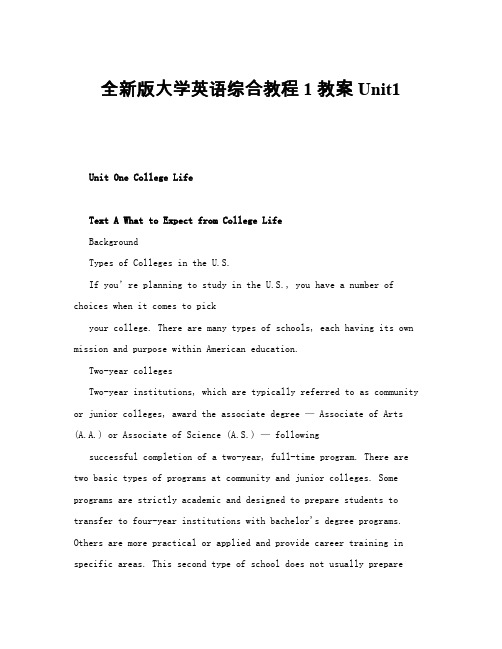
全新版大学英语综合教程1 教案Unit1Unit One College LifeText A What to Expect from College LifeBackgroundTypes of Colleges in the U.S.If you’re planning to study in the U.S., you have a number of choices when it comes to pickyour college. There are many types of schools, each having its own mission and purpose within American education.Two-year collegesTwo-year institutions, which are typically referred to as community or junior colleges, award the associate degree — Associate of Arts (A.A.) or Associate of Science (A.S.) — followingsuccessful completion of a two-year, full-time program. There are two basic types of programs at community and junior colleges. Some programs are strictly academic and designed to prepare students to transfer to four-year institutions with bachelor's degree programs. Others are more practical or applied and provide career training in specific areas. This second type of school does not usually preparestudents for transfer to a four-year institution, though some of the credits earned may still be accepted by a four-year institution.A small number of two-year colleges offer the final two years of the undergraduate program only, awarding the bachelor‘s degree rather than the associate degree. Most community and juniorcolleges are publicly supported by the state and local communities, although some are private. Some private two-year colleges areproprietary or run for a profit.Four-year colleges and universitiesThe college or university (sometimes called an institute when it emphasizes engineering or other technical courses) awards the bachelor's degree. The Bachelor of Arts (B.A.) or Bachelor of Science (B.S.) degrees are the most common, but a variety of bachelor's degrees by other names are also granted. Bachelor's degrees are typically awarded following successful completion of a four-year, full-time program. Programs in some fields of study or at some institutions can be longer than four years. There are both public and private colleges and universities in the United States, and some have an affiliation with a religious denomination.Public versus privatePublicly supported schools are generally state colleges or universities or two-year community colleges. These institutions receive most of their funding from the states in which they are located. Private schools generally have higher costs because they do not receive the sameprimary funding from the state and federal government. Colleges and universities with religious affiliations are private. Most of them are Christian (Roman Catholic and Protestant), although there are a small number of Jewish and Islamic institutions. In most cases, you do not need to be a member of a particular church or religious group to attend a religiously affiliated college and enrollment in these institutions will not usually interfere with your own religious views. Privately owned colleges Proprietary institutions are different from other types of schools in that they are privately owned and run for a profit. They are "educational businesses" that offer services and courses similar to those at other institutions, but you need to be very careful and research their accreditation status. Their programs tend to be technical and pre-professional courses of study.Almost all the colleges in the United States are now coeducational, which means that both men and women attend. There are also a small number of single-sex schools, some for men and some for women. Faculty, administration, and staff members will likely be of both sexes at any college.Words and Expressions1.a little bit有点He was a little bit under the weather. , 他生病了。
unit7 College Life 教案(优选.)
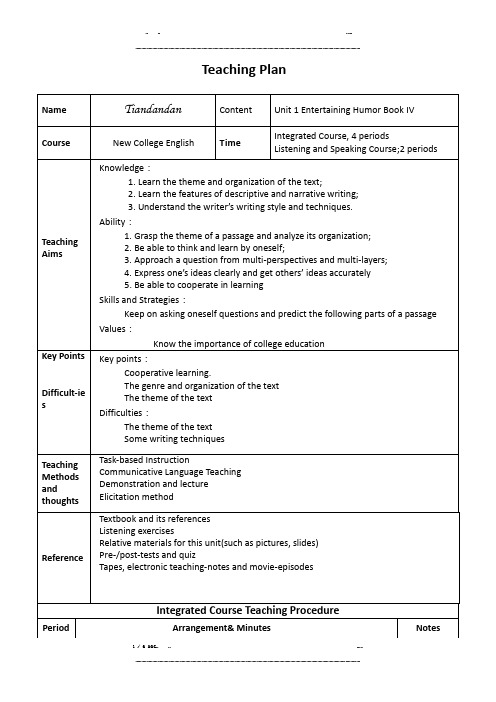
6. distinguish…from… (ll. 15-16)
e.g. Speech distinguishes man form the animals.
7. ill-advised (ll. 17)
ill-informed
ill-bred
nered
The chances of getting in without a ticket are slim.
5. grade-point average (ll. 29-30)
= GPA
6. by no means (ll. 34)决不…
e.g. By no means can you succeed without making any effort.
Teaching Plan
Name
Tiandandan
Content
Unit1 EntertainingHumorBookIV
Course
New College English
Time
Integrated Course,4periods
Listening and Speaking Course;2periods
13) had 14) catch 15) marks
16) parents 17) obtain/get 18) teachers
19) relax 20) shape
Further Development
•Enriching Your Word Power
1-6 A A B B B C 7-12 C C B B C A
ill-natured
ill-tempered
《综合英语(第一册)》电子教案Unit1Collegelife
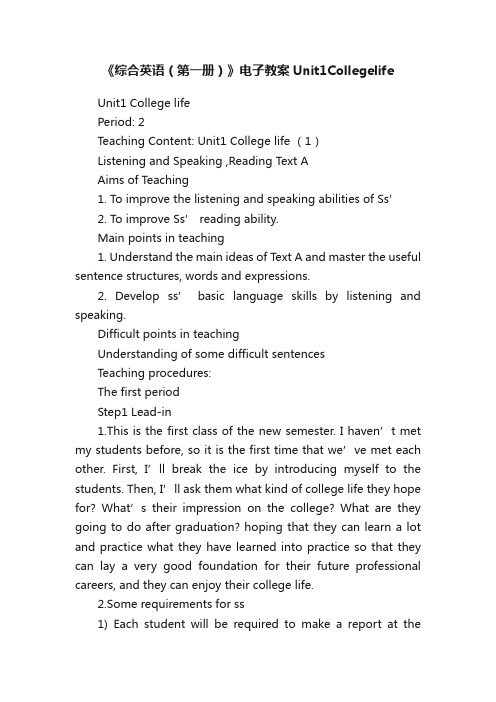
《综合英语(第一册)》电子教案Unit1CollegelifeUnit1 College lifePeriod: 2Teaching Content: Unit1 College life (1)Listening and Speaking ,Reading Text AAims of Teaching1. To improve the listening and speaking abilities of Ss’2. To improve Ss’ reading ability.Main points in teaching1. Understand the main ideas of Text A and master the useful sentence structures, words and expressions.2. Develop ss’ basic language skills by listening and speaking.Difficult points in teachingUnderstanding of some difficult sentencesTeaching procedures:The first periodStep1 Lead-in1.This is the first class of the new semester. I haven’t met my students before, so it is the first time that we’ve met each other. First, I’ll break the ice by introducing myself to the students. Then, I’ll ask them what kind of college life they hope for? What’s their impression on the college? What are they going to do after graduation? hoping that they can learn a lot and practice what they have learned into practice so that they can lay a very good foundation for their future professional careers, and they can enjoy their college life.2.Some requirements for ss1) Each student will be required to make a report at thebeginning of class2) All students are divided into 10 learning groups, with 4 students a group and a group reader will be chosen by themselves3. Tips on how to learn English well at collegeStep2 Listening1. Activity 1 Sound Recognition2. Activity 2 Conversation3. Activity 3 PassageQuestions and Answers1. Q: What is the weather like in Britain?A: It is cool in summer and warm in winter.2. Q: When do the winds bring cool air to Britain?A: In summer.3. Q: Why isn’t there much difference between the summer and winter weather?A: Because the winds from the west blow Britain all the year.4. Q: In which part of Britain is there less rain?A: In the east.5. Q: What is the passage mainly talk about?A: The weather in Britain.Step3 SpeakingThis activity mainly focuses on going over some useful expressions, and how to use them in a real dialog1. Activity 1A: Good morning, Wang Xiaoping.B: Good morning, Huang Linwei.A: How are you this week?B: Just fine. Thank you. And you?A: I’m fine, too. Thank you.A: Hello, Jane.B: Hello, David.A: How are you doing these days?B: Fine, thanks. How about you?A: I’m fine, too. Thank you.B: Is Grace well now?A: She is very well. She is now in China.B: That’s good.The second periodStep4: DiscussionWhat kind of college students do you expect to be?S1:Before I entered the college, I had a dream that I could become the top student in my class. When I woke up, I was determined that I should try my best to make my dream come true. So now I study very hard, and I am sure that my dream will come true some day.S2:After I came to the college, I think that I should develop myself in every field. First, I should study well, and then I should take most of the students’ activities if I am free. I hope that I can become the chairma n of the students’ union of our college, because I can have more chances for practice. In that way, I can learn much more.S3:I hope that I can study well at college. For example, I can read a lot of books, learn a lot from my teachers and classmates, pass every examination and become one of the top students in my class.S4:I hope that I can fully develop myself. First, I can learn as much as I can and pass all the examinations easily. Then, I can make a lot of friends on and off campus so that I can easily get a job after my graduation.Step 5: Fast reading1 Ask ss to read Text A as fast as they can and get the general idea of the passage. Then finish the “reading comprehension” on p82. Close books and concentrate on the recording of Text A3. Read the text aloudStep6 Homework1. Recite the new words on Text A and understand Text A2. Finish off Exs on p10-13。
大学生活英语教案设计模板
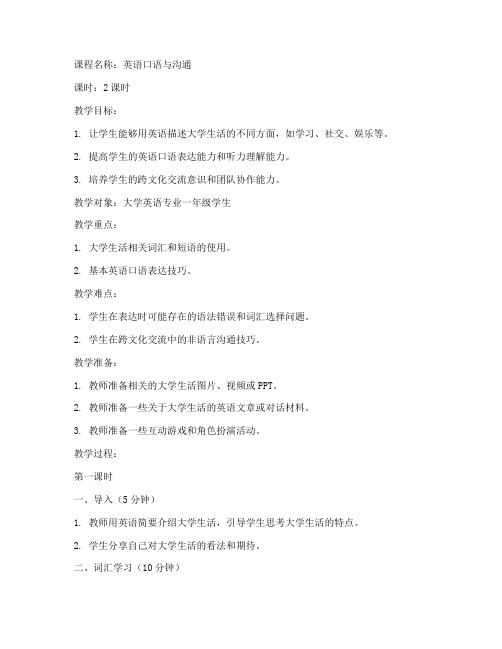
课程名称:英语口语与沟通课时:2课时教学目标:1. 让学生能够用英语描述大学生活的不同方面,如学习、社交、娱乐等。
2. 提高学生的英语口语表达能力和听力理解能力。
3. 培养学生的跨文化交流意识和团队协作能力。
教学对象:大学英语专业一年级学生教学重点:1. 大学生活相关词汇和短语的使用。
2. 基本英语口语表达技巧。
教学难点:1. 学生在表达时可能存在的语法错误和词汇选择问题。
2. 学生在跨文化交流中的非语言沟通技巧。
教学准备:1. 教师准备相关的大学生活图片、视频或PPT。
2. 教师准备一些关于大学生活的英语文章或对话材料。
3. 教师准备一些互动游戏和角色扮演活动。
教学过程:第一课时一、导入(5分钟)1. 教师用英语简要介绍大学生活,引导学生思考大学生活的特点。
2. 学生分享自己对大学生活的看法和期待。
二、词汇学习(10分钟)1. 教师展示大学生活相关的词汇,如:classroom, library, dormitory, campus, club, etc.2. 学生跟读并模仿,教师纠正发音和语调。
三、句子结构练习(15分钟)1. 教师展示一些关于大学生活的简单句子,如:“I study in the libraryevery day.” “I have a lot of friends in my dormitory.”2. 学生根据教师提供的句子结构,自己造句。
四、听力理解(10分钟)1. 教师播放一段关于大学生活的英语对话或视频,让学生听取并回答相关问题。
2. 学生复述听到的内容,教师纠正错误。
五、小组讨论(10分钟)1. 将学生分成小组,讨论以下问题:- What are the differences between high school life and college life?- What do you think is the most important part of college life?2. 每组选一名代表发言,其他组员补充。
《综合英语(第一册)》电子教案 Unit1 College life
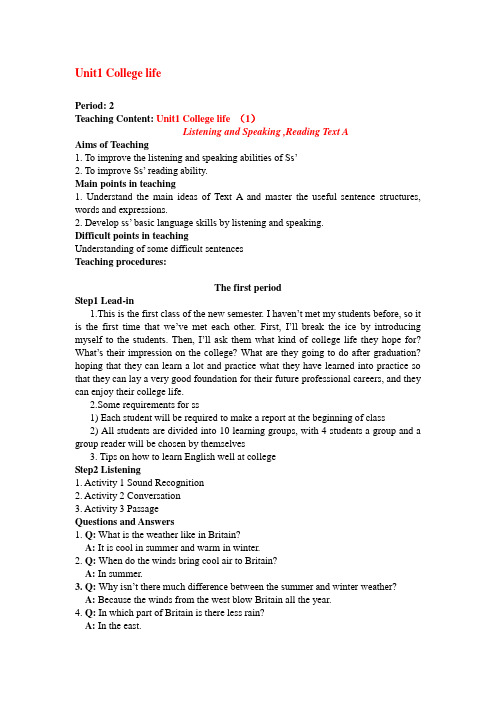
Unit1 College lifePeriod: 2Teaching Content: Unit1 College life (1)Listening and Speaking ,Reading Text AAims of Teaching1. To improve the listening and speaking abilities of Ss’2. To improve Ss’ reading ability.Main points in teaching1. Understand the main ideas of Text A and master the useful sentence structures, words and expressions.2. Develop ss’ basic language skills by listening and speaking.Difficult points in teachingUnderstanding of some difficult sentencesTeaching procedures:The first periodStep1 Lead-in1.This is the first class of the new semester. I haven’t met my students before, so it is the first time that we’ve met each other. First, I’ll break the ice by introducing myself to the students. Then, I’ll ask them what kind of college life they hope for? What’s their impression on the college? What are they going to do after graduation? hoping that they can learn a lot and practice what they have learned into practice so that they can lay a very good foundation for their future professional careers, and they can enjoy their college life.2.Some requirements for ss1) Each student will be required to make a report at the beginning of class2) All students are divided into 10 learning groups, with 4 students a group and a group reader will be chosen by themselves3. Tips on how to learn English well at collegeStep2 Listening1. Activity 1 Sound Recognition2. Activity 2 Conversation3. Activity 3 PassageQuestions and Answers1. Q: What is the weather like in Britain?A: It is cool in summer and warm in winter.2. Q: When do the winds bring cool air to Britain?A: In summer.3. Q: Why isn’t there much difference between the summer and winter weather?A: Because the winds from the west blow Britain all the year.4. Q: In which part of Britain is there less rain?A: In the east.5. Q: What is the passage mainly talk about?A: The weather in Britain.Step3 SpeakingThis activity mainly focuses on going over some useful expressions, and how to use them in a real dialog1. Activity 1A: Good morning, Wang Xiaoping.B: Good morning, Huang Linwei.A: How are you this week?B: Just fine. Thank you. And you?A: I’m fine, too. Thank you.A: Hello, Jane.B: Hello, David.A: How are you doing these days?B: Fine, thanks. How about you?A: I’m fine, too. Thank you.B: Is Grace well now?A: She is very well. She is now in China.B: That’s good.The second periodStep4: DiscussionWhat kind of college students do you expect to be?S1:Before I entered the college, I had a dream that I could become the top student in my class. When I woke up, I was determined that I should try my best to make my dream come true. So now I study very hard, and I am sure that my dream will come true some day.S2:After I came to the college, I think that I should develop myself in every field. First, I should study well, and then I should take most of the students’ activities if I am free. I hope that I can become the chairman of the students’ union of our college, because I can have more chances for practice. In that way, I can learn much more.S3:I hope that I can study well at college. For example, I can read a lot of books, learn a lot from my teachers and classmates, pass every examination and become one of the top students in my class.S4:I hope that I can fully develop myself. First, I can learn as much as I can and pass all the examinations easily. Then, I can make a lot of friends on and off campus so that I can easily get a job after my graduation.Step 5: Fast reading1 Ask ss to read Text A as fast as they can and get the general idea of the passage. Then finish the “reading comprehension” on p82. Close books and concentrate on the recording of Text A3. Read the text aloudStep6 Homework1. Recite the new words on Text A and understand Text A2. Finish off Exs on p10-13。
大学体验英语综合教程1_第三版_Unit_1_电子教案
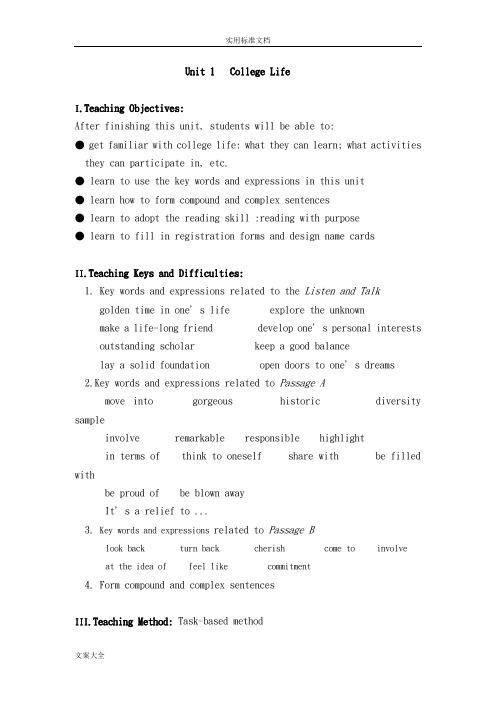
Unit 1 College LifeI.Teaching Objectives:After finishing this unit, students will be able to:● get familiar with college life: what they can learn; what activitiesthey can participate in, etc.● learn to use the key words and expressions in this unit● learn how to form compound and complex sentences● learn to adopt the reading skill :reading with purpose● learn to fill in registration forms and design name cardsII.Teaching Keys and Difficulties:1. Key words and expressions related to the Listen and Talkgolden time in one’s life explore the unknownmake a life-long friend develop one’s personal interestsoutstanding scholar keep a good balancelay a solid foundation open doors to one’s dreams2.Key words and expressions related to Passage Amove into gorgeous historic diversity sampleinvolve remarkable responsible highlightin terms of think to oneself share with be filledwithbe proud of be blown awayIt’s a relief to ...3. Key words and expressions related to Passage Blook back turn back cherish come to involveat the idea of feel like commitment4. Form compound and complex sentencesIII.Teaching Method: Task-based methodIV.Suggested teaching procedures and class activitiesSession 1 (3 periods)Introduction of college life (1 period)1.Your course: compulsory/required course and optional/elective courseCompulsory/Required course, studying for a degree or diploma;Optiona/Elective course, not studying for a degree or diploma.2. Your name: Freshman, Sophomore, Junior, Senior3. College students’ psychological changing (in my opinion)Freshman: Don’t know you don’t know yourself.Sophomore: Don’t know you know yourself.Junior: Know you don’t know yourself.Senior: Know you know yourself.4. Education: Junior college student; Undergraduate studentPostgraduate{master student and doctor student}5. DegreeBachelor degree; Master degree; Doctor degree6. Teacher’s professional titleInstructor or lecture; Associate professor; Professor 7. Some other aspects of college lifeCertifications (CPA,CET 4/6, the Certificate of the Primary Computer Examination ,etc.)Activities ( martial arts ,etc .)Leisure Time ( Library, Dormitory, Sleeping, Seeing a film , Playing computer, Etc. )( introduce the contents)Section I Listen and Talk (2 periods)Step 1 Lead in (25 mins)1.Warm up questions:What’s your first impression of our school?What do you expect to learn in your college?What are your main activities in college life? Can you describe them?2.Listening: (Listen to the passage and fill the missing words in theblanks. Listen three times)Keywords:spend, golden, explore, experience, lifelong, various, develop, scholars, lay, open3. Words and Phrasesgolden: adj. 黄金的,宝贵的lifelong: adj. 终生的,一生的Opportunity 机会、机遇Outstanding scholar 杰出的学者keep a good balance: 保持良好的平衡lay a solid foundation: 打下坚实的基础4. Answer: 1.explore 2.experience 3.various 4.develop5.scholarsy5. Talking about the pictures or say something about your college life(Pair-work)Keywords: discuss, meet, chat, communicateStep 2 Dialogues (40 mins)1. Listen to the two sample dialogues and try to answer some questionsDialogue 1 Meeting on CampusWho is Mike?What help did Mike need?Who is Dr. Wang?Dialogue 2 At the Registration OfficeWhere are the two speakers?What are they doing?Which elective course does Mike choose at last?2. PracticeRead two dialogues in pairs (pair work)3. Learn some useful phrases and expressions:have been looking forward to doing sth.: 一直希望着I’m here to see whether you need any help. 我能帮你什么忙吗?show sb. the way: 带某人去both … and …: 既有…也有…drop out: give uprefund: pay backfill in the forms: 填表格4.New words and expressionsStep 3 Communicative Tasks (25 mins)Work in pairs and act the dialogues to the whole class.Task 1: Meeting with a foreign student and talking about studies Tips: (P7 )Glad to meet you.Where are you from?Which are you in?I’m majoring in …About your major name: A ccountantTask 2: Helping a foreign friend select his course at the registration officeTips: (P7)What’s your favorite subject …What course do you like most?Insightful, informative, boring, practical, fantastic, be interested inStep 4 Assignment for this session1. Pair taskRole-play Communicative task 2 according to the topic and the situationof the task. Performance in class is expected in the next class.2. Individual tasks1) Learn the useful words & phrases of Liatsen and Talk.2) Listen to and read Passage A aloud for at least two times.3. Group tasks1) Do the pre-reading exercise of Passage A in groups.2) Analyze the organizing structure of Passage A in groups.Session 2 (4 periods)Lexical preparation for Passage AStep 1 Pre- reading Tasks (15 mins)1.Culture notes:The Introduction of Harvard UniversityHarvard is located in Cambridge, Massachusetts, on the eastern coast of the United States. Harvard University, which was established in 1636, is the oldest institution of higher learning in the United Sates. Most of Harvard University’s campuses are located in Cambridge and Boston, Massachusetts, on the eastern coast of the United States of America.It has about 2 100 faculty members and more than 10 000 academic appointments in affiliated teaching hospitals. Harvard University is made up of 11 principal academic units — ten faculties and the Radcliffe Institute for Advanced Study. The ten faculties oversee schools and divisions that offer courses and award academic degrees. There are about 21 000 students — about 6 700 undergraduates and 14 500 graduate and professional students.Seven presidents of the United States —John Adams, John Quincy Adams, Theodore and Franklin Delano Roosevelt, Rutherford B. Hayes, John Fitzgerald Kennedy and George W. Bush — were graduates of Harvard. It has produced more than 40 Nobel laureates.Shopping WeekShopping Week is a special time for freshmen at college to sample classes, which could help them decide which courses they are going to take in the beginning of a school year.2. Lead-in questions:①What do you expect to learn as a freshman?Answer: (The answer may vary. )The most important thing is to learn how to learn.②How do you guess the author of the passage would feel about her first week at Harvard, a world-famous university?Answer: (The answer may vary. )The student thought that her first week at Harvard was very impressive, because the new college life would be a once-in-a-life journey for her, at a world-famous university in particular.Step 2 While- reading Tasks (75 mins)Reading Task 1:Read the text as quickly as possible and try to find the answer to the following questions:1).What did the author think of being a freshman at Harvard? Answer: She thought it was very pleasant and lucky to be a freshman at Harvard.2).How did the author get along with her roommates?Answer: She got along with them very well and they had helped her a lot.3).What difficult decisions did the girl have to make in the “Shopping Week”?Answer: She had to decide what classes to take.4.)What did the author think of eating on campus for a freshman at Harvard? Answer: Eating is one of the highlights for freshmen at Harvard. 5).How did the author appreciate meeting the other students at Harvard? Answer: Appreciating and being surrounded by so many gifted people was what had made her first week at Harvard a truly priceless experience. Reading Task 2: Chart on P 9Reading Task 3 :Skim the text and try to find the main ideaMain idea: The first day is gorgeous for a freshman at Harvard. The authorlived with four girls, who helped her through the difficult adjustment process. Freshmen at Harvard can sample classes during “Shopping Week”. Eating is one of the most important and enjoyable highlights for studentsat Harvard. The best assets for Harvard students according to the authoris to have met so many gifted people.Step 3 Exploring vocabularyStudents work in groups to pick out the sentences containing the key words or expressions displayed on PPT from Passage A and discuss how they are used in context.The teacher may assign each group two or three words or expressions.Key words and expressions on PPT:move into gorgeous historic diversity sampleinvolve remarkable responsible highlightin terms of think to oneself share with be filledwithbe proud of be blown awayStep 4 Further studyWords for further study1.The day a freshman moves into Harvard Yard is said to always be a gorgeous one and this was certainly true of my first day at Harvard.It is always said that the day a freshman starts college life in Harvardis very exciting and pleasant and the author thought this was also trueof her own first day at Harvard.move into: to start living inExamples:She decided not to move into the new apartment until she had finished decorating.We’re excited to move into a new home.Harvard Yard: the main campus of Harvard Universitygorgeous: extremely pleasant or enjoyableExamples:John said that he met a gorgeous girl at the party last night.Do you want to sample some of the jam? It is gorgeous.2.historic: famous or important in historyExamples:Today is a historic occasion for our country.It was difficult for the enterprise to expand during a time of historic change.cf. historical: connected with the past, or connected with the study of the pastExamples:Can you tell me something about the historical background to the Civil War?They went to Yuelu Academy to do some historical research. Notes: Historic is usually used to describe something so important that is likely to be remembered, while historical usually describes something that is connected with the past or with the study of history, or something that really happened in the past.3.I gazed out the window at this captivating scene and thought to myself “No freshman should be so lucky!”.I looked out through the window of the car at this fascinating scene and had a thought in my mind: “I should be the luckiest freshman!” think (sth) to oneself:to have a thought in one’s mind, but not tell it to anyoneExamples:After listening to the professor’s suggestion, Jane thought to herself,“I’m sure I will make it.”He gazed out the window at this boundless grassland and thought tohimself, “What a beautiful scenery it is!”4.I’m sharing a suite w ith four other girls that has four single bedrooms and a large common room.I am living in a suite with other four girls, and the suite consists of four single bedrooms and a large common room.share with: to use, participate in, enjoy, receive, etc., jointly Examples:The two chemists shared the Nobel prizeKate is a very generous girl, for she always shares what she has with others5.We’re all completely different in terms of background, ethnicity, religion, and interests — we reflect the diversity that Harvard is so proud of.T he other four girls and I am quite different in terms of background, ethnicity, religion, and interest, which is refl ection of the variety that Harvard is proud of.in terms of: with regard to the particular aspect or subject specified Examples:He’s quite rich in terms of money, but not in terms of happiness.It is difficult to express it in terms of science.diversity: a range of different people or things; varietyExamples:Diversity is conducive to the learning environmentWe should get a thorough understanding about the cultural diversity of the United States.6.During this first week, it’s a relief to have four girls I can call friends and that can help me through this adjustment process which is quite difficult at times.In the first week, I am lucky to have the four girls that I can callfriends. It is them who helped me through this adjustment process, which is rather hard sometimes.it is a relief to (do sth): to have a feeling of comfort when something frightening, worrying or painful has ended or has not happened Examples:I hate to say it, but it was a relief to have him out of the house.It is a relief to see you get through those terrible days.7.Thankfully, Harvard allows freshmen to sample classes during “Shopping Week”.sample: to try an activity, go to a place etc. to see what it is like Examples:We sampled the stuff and found it satisfactory.I sampled several classes and decided to choose four of them this semester.8. Which to get involved in?get involved in: to take part in an activity or eventExamples:I got involved in a quarrel about the priceHe regretted that he got involved in that matter.9.... but it’s where we eat that’s truly remarkable.remarkable: unusual or surprising and therefore deserving attention or praiseExamples:She is remarkable for her sweet temperWhen we went swimming last summer, we saw the most remarkable sunset at the beach.10. Our dining hall is more like a church or a museum than a cafeteria:The dining hall is like a church or a museum rather than a cafeteria.11. ... and is filled with statues and portraits of famous figures from Harvard’s past.be filled with: to become completely fullExamples:After reading his poems, I was filled with admiration.I didn’t go last time because my hands were filled with the paper work.12.All of these first-week experiences will make great life-time memories but the best assets Harvard has offered me thus far have been the other student s I’ve met:The first week experiences will make a life-time impression on me, but the most valuable thing Harvard University has offered me so far has been the students I have met on campus.13. I’m blown away!be blown away: to be extremely impressedExamples:Students were blown away by his inspiring speech.Everyone I told that story to, I mean everyone, is just blown away.14. One week down, four more years to go —I can’t wait: One week had passed, and the author was looking forward to the coming four years.Step 5 Assisment1. Individual tasks1) Write a paragraph describing the most unforgettable during the pastweeks( The students are expected to use the words and expressions learned in the passage)2) Do Exercises 4-7.3)Retell Passage A with the key words.2. Group TaskAnalyze the organzing structure of Passage B in groups.OPTIONAL (1 period )Passage B Wish for the Freshman Year (4 periods)Step 1 Pre-reading Tasks (15 mins)1.Greetings and a brief revision(individual work)Ask students present their dialogues according to “Talk About It”2.Lead-in questions:How do you think you’ll feel after four years of college?3.Culture NotesGrading System in the U.S.Most colleges use letter grades like A, B, C, D, F, and some use plus or minus like B-or C+. To computer students’ averages they say A=4, B=3, C=2, D=1, F=0. It takes an average of 2.0 to graduate. Grades of F must be repeated to get credit. Most students take 5 or occasionally 6 courses per semester, and most courses are 3 credits. It usually takes between 120 and 130 credits to graduate. A few colleges use numerical grades instead of letters. If so, most likely A=90, B=80, C=70, D=60, F=50, but this may be up to the professor.Step 2 While-reading Tasks (75mins)1.Read the text as quickly as possible and try to find the answer to thefollowing questions:1)Why was the author less eager to graduate than his classmates?2)What was he thinking about while he was taking a walk on campus?3)What is the main idea of the passage?2. Read again and find the key words from each paragraph.Para.1: introductory paragraph. Author’s attitude (envy)Para 2: sophomore year (remarkable year)Para 3: soul-searching (reminiscing)Para 4: queasy feelingPara 5: a torture ideaPara 6: concluding paragraph. Cherish3. Language points:1)look back (on sth.): to review the past; to think of what has happenede.g. Looking back on the past, I can now see that I have wasted somuch of my precious time.He looks back at the four years of college with satisfaction.2)schedule of classes:a timetable on which class times are marked out 课表3)envy:n. a feeling you have towards someone that you wish you couldhave the same thing or quality they havev. to feel envy of sb. or at sth.4)turn back: to (cause to) returne.g. We’d better turn back. It’s getting dark.5) remarkable: worth mentioning; unusuale.g. a remarkable person/feat/event/career/talent/achievementShe is remarkable for her sweet temper.6)come to: to learn to, to grow toe.g. He had come to like the city better after living here for three years.7) involve: to have as a part or resulte.g. Taking the job would involve living abroad.8)find oneself doing…e.g. I find myself reading alone in the library.9)reminisce (about sth/sb): to talk or think about past experience,esp. pleasant onese.g. The two friends were reminiscing about their youth.10)at the idea of: at the thought ofe.g. Smiles boarded on my mother’s face, she just couldn’thelp it at the idea of the family reunion.11) queasy feeling: an uneasy feeling12)feel like: to have a wish for; wante.g. It is such a fine day. I do feel like going out for a picnic.13) contemplate: to think deeply and thoughtfullye.g. The doctor contemplated the difficult operation he had to perform.14) torture: n. the act of causing someone sever physical paine.g. It was sheer torture to have him play the violin so badly.The interview was sheer torture from start to finish. 15) cherish: to care for tenderly; love; to keep a feeling deeply and firmly in minde.g. The old man cherished the girl as if she were his daughter.Children need to be cherished.4. some new words and expressionsStep 3 Post-reading Tasks (45mins)1.Summarize the passageSummary: College is safe laboratory in which to experiment with new things. There are no parents around to control you or make all decisions for you. But most of the decisions you make don’t have as great a risk as they will have after college. Being a student is a real career but only a temporary one. Teachers can give some guidance without being either parents or bosses. Classmates can set either a good or a bad example, and you can learn to tell the difference. What happens outside the classroom is an important part of the college experience. Students should cherish all of this like the student in the story, because they may never have such and opportunity again.2.Check the answers of Ex.12, 13 and 14Step 4 Assignments1.Read Passage B.2.Review the words and phrases in Passage BSection III Write and Produce (2 periods)Step 1 Revision (10 mins)Dictation of words and phrases in P assage A and BStep 2 Grammar (35 mins)1.Forming compound and complex sentencesSimple sentence: Birds sing. S + VCompound sentence:It was late, so we went home.S + V S + VHere “so” is a conjunction.2.Conjunctionsthat, before, whether, if, although, because, as long as, as soon as, since, after, who, which, whom, those, why, where, how, when3.Do Ex.17 and 18 and check the answers.4.Pair works. Do Ex.19 in pairs.Step 3 Practical Writing (40 mins)1.Registration FormsThink about it: What is registration form?How to fill registration form?2.Work in pairs. Make a registration form for your friend. CardsWhat’s name card?eful abbreviationsAdd. Tel. Email O.H. P.C. Fax5.Do Ex. 20 and check the answer (personal work)Step 4 Assignments (5mins)Ex.21. Design a business card.。
大学生活英语教案
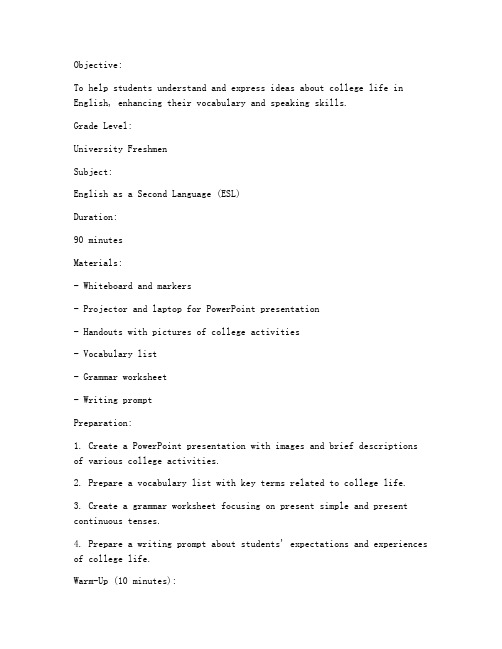
Objective:To help students understand and express ideas about college life in English, enhancing their vocabulary and speaking skills.Grade Level:University FreshmenSubject:English as a Second Language (ESL)Duration:90 minutesMaterials:- Whiteboard and markers- Projector and laptop for PowerPoint presentation- Handouts with pictures of college activities- Vocabulary list- Grammar worksheet- Writing promptPreparation:1. Create a PowerPoint presentation with images and brief descriptions of various college activities.2. Prepare a vocabulary list with key terms related to college life.3. Create a grammar worksheet focusing on present simple and present continuous tenses.4. Prepare a writing prompt about students' expectations and experiences of college life.Warm-Up (10 minutes):1. Start the class with a brief conversation about students' backgrounds and what they hope to achieve in college.2. Ask students to share their favorite activities from high school and how they think these activities might change in college.Vocabulary Development (15 minutes):1. Introduce the vocabulary list with pictures to help studentsvisualize the terms.2. Go through each word, using examples and asking students to provide synonyms or antonyms.3. Have students practice forming sentences using the new vocabulary.Grammar Focus (20 minutes):1. Present the grammar topic: present simple and present continuous tenses.2. Use the PowerPoint presentation to illustrate situations where each tense is appropriate.3. Provide examples and have students practice forming sentences with the new grammar structures.4. Conduct a short activity where students ask and answer questions about their college life using the correct tense.Listening Activity (15 minutes):1. Play a short audio clip about college life, such as a university orientation video or a student interview.2. Have students listen and take notes on the key points discussed.3. Pause the audio and have students discuss what they heard in pairs or small groups.Speaking Activity (20 minutes):1. Divide the class into small groups.2. Assign each group a college activity to research and present.3. Groups should prepare a short presentation using the vocabulary and grammar learned in class.4. Allow each group to present their findings to the class.Writing Activity (20 minutes):1. Distribute the writing prompt to students.2. Provide a few minutes for students to brainstorm ideas and organize their thoughts.3. Have students write a short essay or paragraph about their expectations and experiences of college life.Conclusion (10 minutes):1. Review the key vocabulary and grammar points covered in the lesson.2. Ask students to share their writing or discuss the most interesting college activities they learned about.3. Summarize the importance of being prepared for the diverse experiences that college life brings.Homework:1. Review the vocabulary list and grammar worksheet.2. Write a short essay on the writing prompt provided, focusing on personal experiences or future goals.Assessment:- Participation in class discussions and activities- Quality of the writing assignment- Completion of homework tasks。
Unit1CollegeLife123PPT教案
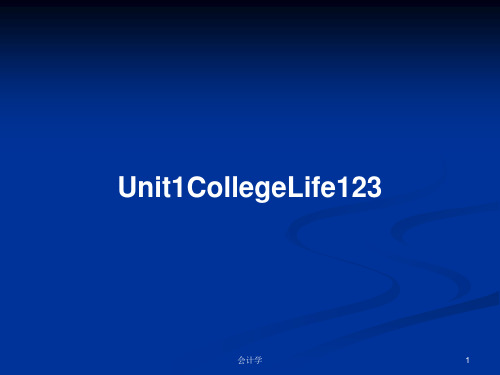
Harvard was a young minister who,on his death in 1638,left his library and half his estate to the newly established institution.
It is the oldest institution of higher learning in the United States.
第9页/共72页
SAT(Scholastic Assessment Test)(“学术水平测验考试” 是美国高中生进入美国大学的标准入学考试)
The College Board’s SAT Program consists of the SAT Reasoning Test TM(SAT)and SAT Subject Tests TM. The SAT is three hours and 45 minutes long and measures skills in three areas: critical reading , math , and writing. Although most questions are multiple choice,students are also required to write a 25-minute essay.
In 1853,he moved to Boston,where he enlisted the support of the scientific community to create an institution for technical and scientific education. It was largely through his efforts that the Massachusetts Institute of Technology was born in 1861.
趣味英文认识大学生活教案

Objective:To help new college students understand and appreciate the various aspects of college life through interactive activities and engaging discussions. The lesson aims to familiarize students with common college experiences, terminology, and cultural norms.Duration:1 hourMaterials:- Whiteboard and markers- Projector and computer for PowerPoint presentation- Handouts with college life facts and vocabulary- Colored cards or sticky notes- Pen and paper for each studentLesson Outline:I. Introduction (5 minutes)1. Greet the students and ask them to introduce themselves, including their names, majors, and why they chose their college.2. Briefly explain the purpose of the lesson: to explore the fun and exciting aspects of college life.II. Icebreaker Activity: College Life Bingo (10 minutes)1. Hand out bingo cards with common college experiences (e.g., attending lectures, joining a club, studying in the library) and corresponding vocabulary words.2. As the teacher reads out college-related statements, students markoff the corresponding experiences on their bingo cards.3. The first student to get a full line wins a small prize.III. Interactive Presentation: A Day in the Life of a College Student (15 minutes)1. Use a PowerPoint presentation to showcase a typical day in the life of a college student, including morning routines, classes, extracurricular activities, and night study sessions.2. Discuss each aspect of the presentation, using vocabulary and phrases relevant to college life.3. Encourage students to share their own experiences or ask questions about the content.IV. Group Discussion: Pros and Cons of College Life (10 minutes)1. Divide the class into small groups.2. Each group discusses the pros and cons of college life, using the handouts provided.3. Groups rotate and share their findings with the class.V. Vocabulary Building: College Life Terminology (10 minutes)1. Introduce key vocabulary related to college life (e.g., dormitory, campus, semester, academic advisor).2. Write the words on the board and ask students to define them.3. Use context clues and pictures to reinforce the meanings.VI. Role-Playing: College Scenarios (10 minutes)1. Create several scenarios involving common college situations (e.g., meeting a professor, resolving a conflict with a roommate).2. Pair students up and assign them a scenario to act out.3. After each role-play, discuss the situation and how the characters could have handled it better.VII. Conclusion and Reflection (5 minutes)1. Summarize the key points discussed during the lesson.2. Ask students to reflect on their first week of college and share any new insights or experiences.3. Encourage students to continue exploring and embracing the unique aspects of college life.Assessment:- Observe participation and engagement during the activities.- Check the completed bingo cards and vocabulary handouts.- Collect written reflections or responses to discussion questions.Note:This lesson is designed to be interactive and student-centered. Encourage students to speak up, ask questions, and share their own stories, which will enhance the learning experience and help them feel more connected to their new college environment.。
- 1、下载文档前请自行甄别文档内容的完整性,平台不提供额外的编辑、内容补充、找答案等附加服务。
- 2、"仅部分预览"的文档,不可在线预览部分如存在完整性等问题,可反馈申请退款(可完整预览的文档不适用该条件!)。
- 3、如文档侵犯您的权益,请联系客服反馈,我们会尽快为您处理(人工客服工作时间:9:00-18:30)。
生活的目标,增强学生学习英语的自我意识,提高学习英语的 积极性。
内容
教学方法
1. 学习并掌握有关大学生活的重
点词汇、短语及句型; 2. 鼓励学生运用已学知识自编对
分组学习、任务型教学、互动交际法
授课题目
教学目标
教学重点
教学难点 课堂类型 教学方法 课时 实施日期
Unit 1 College Life 大学生活(I)--听说课 Part Ⅰ. Listening & Speaking 知识目标:学习并掌握与大学生活的词汇、短语、以及相关的句型表述。
听懂谈论大学生活的对话并完成相关听力训练。 技能目标:通过词汇、短语及句型学习,能了解与大学生活有关的对话,
to finish these listening exercises. Ss take notes and try their best to master
them.
Task 1 & 2 (situational dialogues) Listen to the conversations carefully and try
Grammar:Adjectives and adverbs
学生分组操练 学生自学
10 mins
1、原级比较
as+ adj./adv.+ as(肯),not so+ adj./adv+ as(否)
2、比较级:形容词、副词的比较级 + than
3、最高级:the + 形容词、副词最高级
分组讨论
4、常用结构
教师答疑
学生完成练习 题,教师随堂答 疑
巩固语法知 识
回顾本次课
教师小结重点、 的重点难点
难点
内容,加强
课后复习
教师布置作业
自觉、高效 完成课后相 关作业
附件(案例,任务书等):
课后作业:将下列短语或句子翻译成英语:
1、从英国来的学生 2、非常喜欢中国
3、网友 4、离家很远
5、最喜欢的艺人
6、上网聊天
教学活动形式 教学目标
师生课前问候 课堂导入
课堂导入
日常口语学习
9. I agree。 我同意。
10. Not bad. 还不错。 教师带读
11. Not yet. 还没。
12. See you. 再见。 学 生 分 组 操 练
13. Shut up! 闭嘴!
14. So long. 再见。 朗读
15. Why not? 好呀! (为什么不呢?) 16. Allow me. 让我来。
7、城职院大学一年级学生
8、他们不是英国人,是美国人。 9、莉莉对这个大学很熟悉。
参考资料:
《新编大学实用英语教程 1 教师参考书》、《前景基础英语综合教程 1》
教后小记:
attention to…注意 to: prep.
look forward to, get/be used to,devote…to…
教师/录音带读 学生跟读、记忆 分组朗读 举例造句练习
学习生词 掌握重点词 汇、短语的 用法 争取做到 “听说读 写”四会
30 mins 15 mins
听力训练
Task 1 & 2 (o the conversations carefully and try
话,分组表演并听懂相关听力练习;
内容
突破方法
情景会话的理解 如何抓取听力材料中的核心信息词
互动交际、分组比赛
理论/实践/理实一体 授课地点
分组学习、任务型教学、讲授、游戏教学
2
授课班级 2014 学前 2,3 班,物流 1 班
备课时间
2014.9.18
教学过程
时间 分配 3 mins
5 mins
内容/项目/情景
to finish these listening exercises. Ss take notes and try t to master them. 口语句型学习 Language Bank: Greetings:
Responding to greetings:
Asking for personal information: Responding to personal questions:
听力训练 讲解语法知识 点 分组操练对话
教师带读 录音跟读
由易入难完 成听力训 练,学习如 何抓取听力 材料中的核 心信息词
掌握常见的 表示问候的 口语句型
Introducing yourself: Introducing somebody: Responding to an introduction:
复习比较级 和最高级
自查学习
10 mins 3 mins 2 mins
“比较级+and +比较级”--“越来越……” “the +比较级……,the+比较级……”--“越…… 就越……” 5、特殊变化的形容词或副词
完成语法练习 课本 P19
课堂小结
作业布置 1、 复习本次课重点内容,解决难点 2、 完成作业(见附件) 3、 预习课文 A
增进师生感 情、交流学 习生活
学习日常简 单英语口语 灵活运用
词汇短语学习 ① major: n. & v. major in ② senior: adj. a senior student, junior
12 mins
③ introduce: v. introduce sb. to sb. 把……介
绍给…… e.g.: It’s my honor to introduce Mr. Wang to you.
Allow me to introduce myself please. introduction: n. self-introduction 自我介绍 ④ admit: v. be admitted to… 被…录取 ⑤ attention: n. pay
